

To be fair, gambling is not something relatively new around here. The jogo do bicho, for example, was created in mid-1892. There were also times — brief periods in the 10's, 30's and 40's — when casinos could operate freely on Tupiniquim soil. The Federal Lottery, in turn, is still more alive than ever and will be exactly 60 years old in 2022.
But despite this practice being rooted in the history of Brazil, it is perhaps inevitable to observe that the betting market - specifically speaking of online services - in the country has never looked as strong as the scenario seen in recent years.
And to better understand the recent boom, legal issues, industry backstage and risks behind the practice, TecMasters delved into this controversial segment to talk to market experts in the bet to demystify this rising sector.
Betting market is one of the market bets
Before understanding the reason for the recent rise, it is necessary to note that the gambling market has been growing for some time. Since 2009, the segment has presented advances year after year around the world, which reveals a massive interest from players.
And the numbers don't lie: according to a survey by Statista, the global market for the segment more than doubled in 10 years, from a market value of US$ 20.51 billion in 2009 to US$ 55.10 billion in 2019. In 2020, the segment was already approaching US$ 59.79 billion.
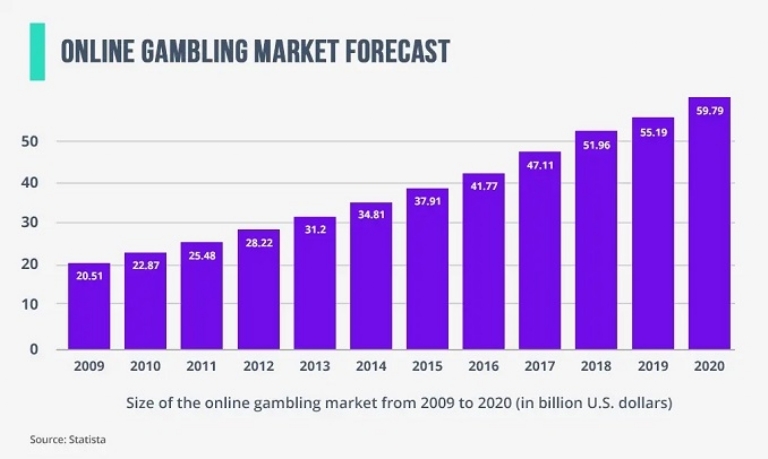
The curious thing is that this ascent should not stop there. The segment observed a “boom” mainly from 2020, the year in which the planet was affected by an unprecedented health crisis. And since then, while several areas have fallen, the betting industry has only increased.
From 2020 to 2021, the growth in market value was 26%. But according to Polaris Market Research Analysis, the prediction is that the gambling market will continue to grow over the next eight years, with the expectation of reaching a revenue of US$ 205.60 billion in 2030.
Of course, the data encompass the entire global scenario, but in Brazil, the situation has not been different.
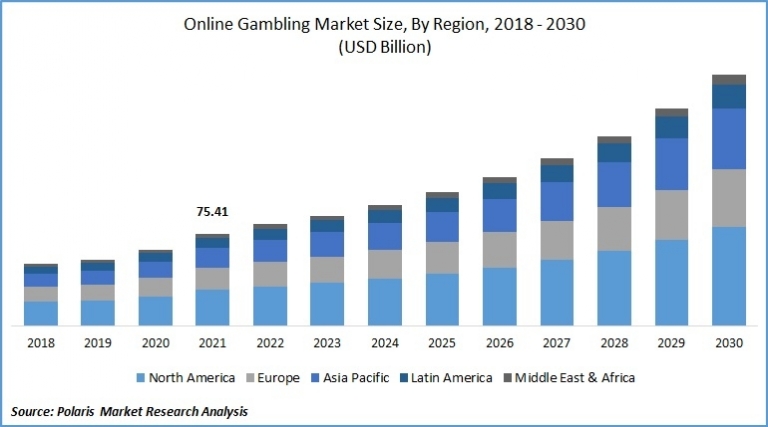
Brazilian interest also high
If the scenario is high abroad, it's no different around here. But in Brazil, the most popular betting segment encompasses the sports sector – which is slightly different from online casinos or popular games of chance in that it requires a study of the chosen sport in addition to the luck factor.
Speaking of numbers, Keyword Planner, Google's search tool, found that about 35,700 searches on the topic are carried out monthly by the Brazilian public. This makes the interest in the country’s sports betting market the largest in South America, well ahead of other peoples such as Colombia, Peru and Argentina.
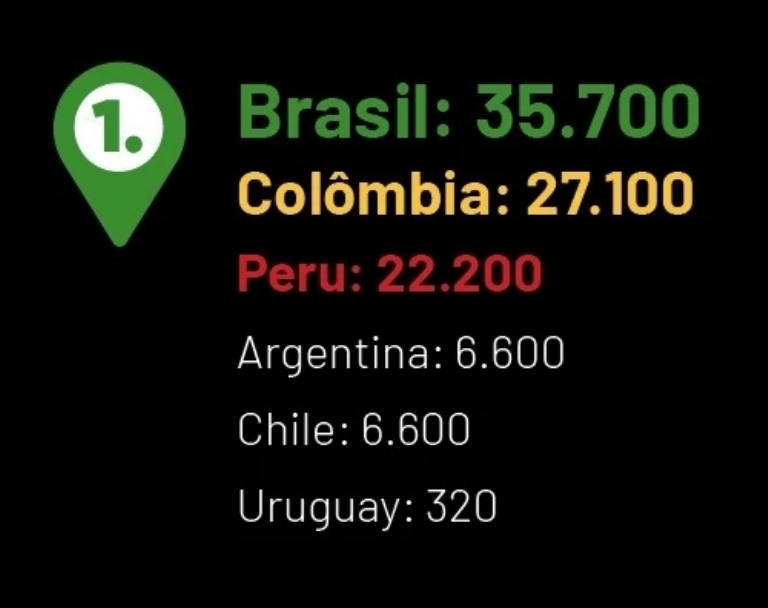
Another survey, carried out by Globo organizations, points out that the search for the terms “bet”, “aposta” or “bet+aposta” has grown fervently since 2020. And as was to be expected, the data was also in line with the increase in advertising investment in sports betting, which also grew in the same period. It's that story: only those who are seen are remembered.
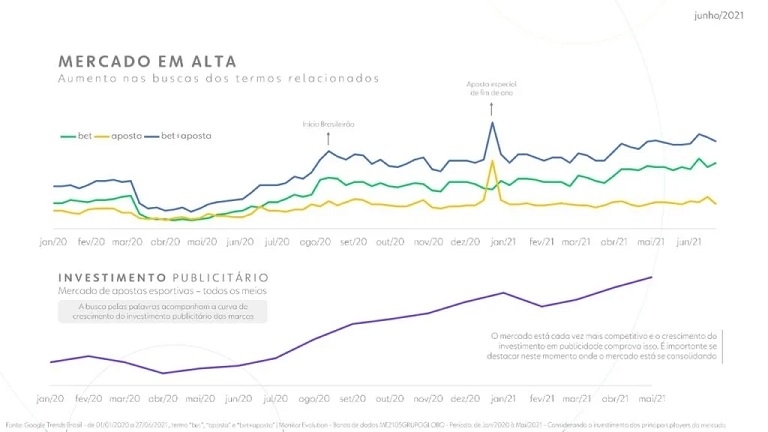
But calm down: is this legal here in Brazil?
“But aren't these practices prohibited in Brazil?” some may be asking. After all, much is said about the growth of the market, but little is said about legal issues here. In this sense, the practice still raises several doubts.
Many are based on Decree Law nº 9.215, which banned gambling in the country in 1946. It turns out that the decree did not take into account the arrival of online services — not least because there was no internet at that time — and, with the contemporary changes, some points were recently reviewed.
In December 2018, then-President Michel Temer passed Law 13,756/2018, which allowed fixed-odds betting — practices in which the winning conditions and the multiplication factor of your bet that will result in the prize are predefined. Sports betting is in this basket and is even the only modalities allowed here in Brazil, according to Marcelo Mattoso Ferreira, partner at Barcellos e Tucunduva Advogados and active in the Games and Esports market.
“The concept of gambling, defined in article 50, §3 of the Criminal Misdemeanors Law, may end up encompassing numerous activities that involve “luck/randomness” and the binomial “gain/loss”. The only modality currently allowed in Brazil is fixed-odds sports betting,” highlighted the lawyer.
The proposal to regulate online betting is stalled in the Senate and needs to be voted on by December 12 this year. In the meantime, companies in the sector take advantage of this to offer their services in Brazil, as they are headquartered and operated abroad.
And with this lack of regulation, the actions of these houses happen without charging taxes or fees — and perhaps that explains, in part, the emergence of so many companies in the segment in recent years.
In short, these modalities are not considered illegal. But who loses is Brazil, which stops profiting from taxes that could be reversed in several areas.
And how to explain this “boom” in national territory?
Still talking about legal issues, the law passed in 2018 may be one of the main factors for the heating of this market in the country. But of course, other factors also come into play, as pointed out by Leonardo Baptista, CEO of the online payment platform Pay4Fun.
“The boom in this betting segment can be attributed to the law passed in 2018, which brought more visibility to this topic. But other factors also contributed, such as the pandemic, which kept people isolated in their homes and contributed to the search for online entertainment, the greater exposure of sports betting sites in advertising and, of course, the fact that gambling is on the Brazilian DNA,” pointed out the executive.
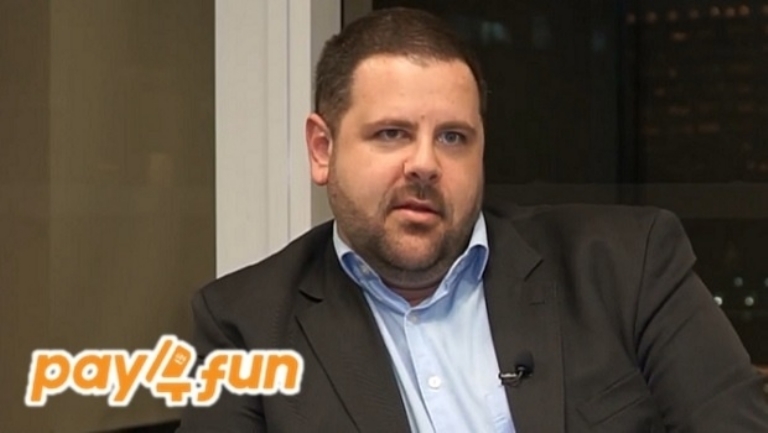
It's almost a domino effect: the possibility of offering services in Brazil without fees or taxes attracts more and more foreign companies, which increase their profits and invest more and more in advertising and sponsorship in Brazilian territory.
A quick analysis of the teams participating in the Brasileirão Serie A is enough to understand the dimension of this. Of the 20 clubs, 20 have sponsorships from bookmakers: América-MG (PixBet), Athletico-PR (Betsson), Atlético-GO (AmuletoBet), Atlético-MG (Betano), Avaí (PixBet), Botafogo (Blaze), Bragantino (NetBet), Ceará (Betcris), Corinthians (galera.bet), Coritiba (Dafabet), Cuiabá (Luck Sports), Flamengo (Pixbet), Fluminense (Betano), Fortaleza (Betcris), Goiás (Pixbet), Internacional ( EstrelaBet), Juventude (Pixbet), Palmeiras (Betfair, in the women's team), Santos (Pixbet) and São Paulo (Sportsbet.io).
It does not matter which means of communication to be observed: there will be some advertisement of some “bet company”. As a consequence, more advertising tends to result in more consumption. And the more consumption, the more attractive the Brazilian market will be for other players to enter the game.
Not least, it is possible to attribute the rise of the betting market in Brazil to the economic crisis experienced in the country. Many are led by the idea that the activity is a form of easy money and the Globo survey found that 52% of respondents entered the sports betting segment to increase income.
And that brings us to another controversial question…
After all, does the betting market make money or not?
Knowing whether the betting market makes money or not is perhaps the question of millions – in this case, literally. The question is similar (but in different segments) to that of NFT enthusiasts who are planning to enter blockchain games or investors who are considering entering the controversial day trade. But as in these other cases, the answer is relative.
Whatever the area of expertise, there will always be a group that manages to get along. And in the betting market is no different: turns and moves on social networks someone comes to show how he won thousands of reais with a very low initial investment.
Therefore, it is possible to make some money with the pitaco market, as suggested by gambler Paulo Nobre, who also sells facilitators for this practice.
“The tendency is for the bank to always win. But where one loses, others win. And not everyone always loses for the bank to win. There are players who also win,” he stated.
But does that mean that entering the betting market will guarantee profits? Not far. First of all, it should be borne in mind that bookmakers, casino companies and other games of chance were created with a view to profit — or does one set up a business with a loss in mind?
That is, as much as there are people who manage to get along, there are many others who lose to it. If in the tonic of capitalism some lose for others to win, the same can be applied to the betting market: some lose for others to win, but many have to fail for the bank to win.
In addition, it is worth noting that betting is not an investment, but entertainment. Luck and knowledge of sports markets, in fact, can increase the chances of winning. But one should never expect a certain return from a business that should be looked at for fun purposes.
“Sports betting is by no means synonymous with investments. Expecting financial results from betting is unfair and anyone who promises financial returns or easy money from betting should be arrested. Bets are for entertainment purposes. You know that money you set aside for going to the movies, clubs or any other hobby or entertainment? Gambling would be one of those types of entertainment,” Baptista pointed out.
Fun vs Addiction: A fine line
The problem is that even for casual gamers focused only on fun, there is a big risk behind the activity: addiction. Of course, there are cases and cases, but the phrase “The important thing is to compete” is often not justified in practice. After all, nobody likes to lose.
When victory (or would it be multiple ones?) comes, the organism itself tries to manifest a sense of well-being, according to psychologist Marcela Ribeiro.
“That 'butterflies in the stomach' felt by many bettors is related to the adrenaline rush involving the practice of betting. This whole process involves the activity of the frontal lobe of the brain, responsible for decision making, planning and discernment. When there is success, the process also involves the hormones dopamine and serotonin, which cause the sensation of pleasure and well-being,” explained the psychologist.
But from there, things get complicated. If there is no emotional control on the part of the practitioner, the activity can become a great risk, whether in case of victory or defeat. In a winning streak, the bettor tends to go full steam ahead. In situations of loss, frustration can feed a hope of reversing the damage.
“If there is a sequence of winnings, the bettor becomes more and more involved and the tendency is to continue betting, entering a vicious cycle precisely due to the constant release of serotonin in the central nervous system. If there is a sequence of losses, he can still remain in this cycle for not conforming, not accepting defeat and not recognizing his own limits,” added Ribeiro.
Also according to the psychologist, this vicious cycle can affect the individual's self-esteem, in addition to causing financial losses and even depression.
Future is promising, but be careful when entering the market
In general, it is almost certain – at least according to the numbers – that the betting market will grow in the coming years, abroad and here in Brazil. Therefore, the trend is that more and more companies enter the game and that the betting community will only increase from now on.
But if bookmakers don't talk about it (or don't do much), here's a warning: whether you're an online casino player, a sports bettor or a mere enthusiast, be careful. It's fun? Certainly. Can you make money? It's okay. But there are risks involved in the process.
Source: Tecmasters